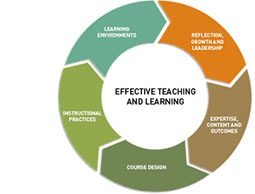Reflection, Growth, and Leadership
What is meant by Reflection, Growth, and Leadership?
The following video Framework for Effective Teaching Dimension 5: Reflection, Growth, and Leadership provides a brief description of this dimension of the Framework for Effective Teaching.
How can I reflect on my teaching with respect to this dimension?
Below are some questions to consider with respect to your reflection, growth, and leadership in teaching and learning:
- How well have my students attained the expected learning outcomes with my current course design or teaching practice?
- What was the quality of my students’ learning experience?
- What are my strengths in teaching? In what areas of my teaching might I improve?
- What new skills or knowledge should I pursue to sustain or improve my students’ learning experience?
- What teaching-focused professional development opportunities do I plan to undertake?
- What have I shared with my colleagues to help sustain or improve students’ learning?
- How have I contributed to the teaching professional growth of my colleagues?
- What have I done to sustain or improve the teaching culture in my department, faculty, subject area or institution?
- What research and/or literature have I engaged with to better understand teaching and learning?
- Have I investigated how my teaching strategies affect student learning?
- Have I disseminated the results of my teaching and learning studies?
Below are some strategies that you might use to collect evidence to reflect on your teaching with respect to this dimension:
Some evidence you might collect on your own which might help you reflect upon your own Reflection, Growth and Leadership includes documentation of:
- Personal responses to those questions asked above.
- Reflection about how your own teaching practice has evolved over time based on experiences and feedback including:
- your strengths and limitations in teaching.
- your past, present and future learning and growth goals related to your teaching practice.
- a description of efforts made to redesign or refocus course content, improve the students’ learning experience, the classroom climate, or your teaching methods.
- Teaching and learning related professional development in which you have participated or delivered (e.g., workshops, courses, certification, sessions or conferences specific to the development of teaching, etc.).
- Both formal and informal teaching discussions in which you have actively participated including any teaching and learning mentorship you have provided.
- A list of academic resources about teaching and learning with which you have engaged.
- A list of teaching and learning related publications and funding with a description of the nature of your audiences and your contributions.
Some evidence you might collect from your peers which might help you reflect upon your own Reflection, Growth and Leadership include:
- Evidence of involvement in program review of other teaching units.
- Letters from those who you have mentored in teaching and educational leadership.
- Letters or recognition of teaching related workshops, seminars, or invited presentations within and outside of the University.
- Evidence of involvement in providing consultation or review to instructors in other units in improving teaching effectiveness.
Some evidence you might collect from your students which might help you reflect upon your own Reflection, Growth and Leadership includes:
- Qualitative analysis of students’ assignments or assessments as connected to your teaching growth plan
- Quantitative analysis of students’ interactions with your online resources as connected to your teaching growth plan.
- Analyses of the changes you have implemented (or intend to implement) as a result of students’ perceptions of the course or your teaching practice (e.g. midterm surveys, email communications, USRI, etc.)
- Letters or comments from graduate students whom you have mentored in a teaching situation (e.g., Teaching Assistants, Research Assistants on a teaching-focused project).
How can CTL help
CTL’s mandate is to support teaching and the professional development of instructors and to support the improvement of teaching at the University of Alberta. To this end, CTL provides formative feedback on teaching observations, consultations about the types of relevant evidence of effective teaching, and information about wise reflective practices.
Any feedback from the CTL is confidential and will only be shared or discussed with the instructor.
CTL supports teaching reflection for formative but not evaluative purposes. Should you require feedback for evaluative purposes you will need to contact your department head or an administrator.
What do I do with this evidence?
Of course, you can use this evidence and reflections to make changes to your course, and we suggest that you do. We also encourage you to share these changes with your students and explain why these changes were made.
Should you wish to document this evidence (and your reflections) we encourage you to consider developing a teaching dossier and other forms of engagement further explained in our What to Do After Reflecting on Your Teaching page.
